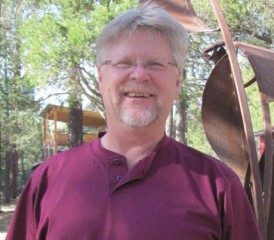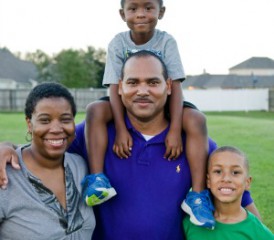Peritoneal Mesothelioma Survivor Remembers 9/11 Differently

Fact Checked | Written by: Tim Povtak | Last Update: 10/24/2024 | 6 Min Read
It’s hard to forget where you were on Sept. 11, 2001, when terrorists declared war on America, crashing two commercial jets into New York City’s World Trade Center and another into the Pentagon in Washington, D.C., dramatically changing the course of our nation.
It’s even harder for Trina C., who felt so alone that day in Flint, Mich.
It was the same morning, almost the exact same time the first jet hit, that Trina was diagnosed with peritoneal mesothelioma cancer and told the disease could kill her in less than a year.
“I could tell by the look on my doctor’s face, when he came into the office, what he was about to tell me wasn’t good,” Trina said. “I’ll never forget that look. Then he told me to go home and get my affairs in order.
“For me, it really is like that Alan Jackson song about 9/11, `Where Were You When the World Stopped Turning.’ I’ll always remember where I was that morning. 9/11 has a little different meaning to me.”
Trina, 47, has exceeded all expectations since then, proving how effective the grueling, eight-hour, cytoreductive surgery and hyperthermic intraperitoneal chemotherapy combination can be for mesothelioma. She is surviving and thriving for more than a decade now, a living inspiration for others. Her last name is being withheld over privacy concerns.
“I have my down days. There is pain from all the scar tissue. And the fear [of it returning] is never far away,” she said. “But I’ve lived to see what my two children became. And that’s all I ever prayed for. If I live to be 48, that’s a wonderful thing. Every day is a blessing. I feel now, like I’m just living the dream.”
Traveling in an 18-Wheeler
Trina is buoyed recently by her latest adventure: traveling the country with a longtime friend who works as an automobile transporter. They ride in his 18-wheeler with a luxury cabin that also serves as a tiny home-away-from-home.
In the past three months, they drove through 44 states, seeing the beaches of Florida, the mountains of Colorado, the sunshine of Southern California, and the lobster traps in Maine. And most everything in between.
“My children are all grown and on their own, so I’m out seeing the country,” she said happily on her cellphone from inside the truck traveling through California. “I have lived life, and seen more than most people ever get the chance to see. I feel lucky. If this had ended 11 years ago, I would have felt cheated. But not now, if it ends today, I’ll have no regrets. I’ve done so much in the last 11 years.”
Mesothelioma Surgery, Recovery Was Difficult
Trina wasn’t always so cheery. Her original diagnosis was difficult to accept. She said she believes her mesothelioma stemmed from secondhand asbestos exposure during her childhood. Both of her parents worked on a General Motors assembly line installing brake parts that contained asbestos.
She began treatment shortly after that 9/11 diagnosis. She had surgery two months later at the National Institutes of Health (NIH) in Maryland, leaving her mentally and physically exhausted. The chemotherapy and radiation were taxing. And there were multiple setbacks after surgery.
“I had surgery on Nov. 15, which I remember because it’s the opening day of deer-hunting season in Michigan. I tell people, the surgeon gutted me the same day my hunting friends were gutting their deer,” she joked.
“I remember how miserable I was. I looked in the mirror, and saw death, and just cried. I knew then I was dying. I told my kids how I wanted my funeral to be. It was tough on them. It was an awful, awful thing to go through. When I left home for surgery, I wasn’t sure I’d ever make it back. The fear was overwhelming.”
Her family medical history made her ordeal even tougher emotionally. Her older brother had died just nine months before. Her mother already was gone. Her stepfather had died earlier from an asbestos-related lung disease. The cancer brought her sisters and her children closer than they ever had been, all rallying around her.
Her Children Became Her Inspiration
Her 15-year-old son, a sports fan, lovingly called her “Spalding,” after she lost her hair during chemotherapy, often putting his hand atop her bald head like he was palming a basketball. Her 19-year-old daughter became a leader at home, paying the bills, buying the groceries, embracing her mother’s illness. She would make her mother exercise in the house.
She talked with other survivors, joined a support group, and became Facebook friends with other mesothelioma patients. She reached out for help. And she got it.
“They kept me positive, and once I got back on my feet, I tried to do everything, thinking I didn’t have much time,” she said. “I went on a cruise. I went to the Rocky Mountains, went white water rafting, to a NASCAR driver’s meeting.”
Staying Connected to Mesothelioma Community
Trina soon returned to work for the same large retailer where she was before. She retired recently with a nice pension and full disability after 25 years with the company. She sold her home and moved to a smaller place on a beautiful Michigan lake, where she now often watches the world go by.
“I tell people all the time, `Life is gift.’ And I love it more than anything,” she said. “So much with cancer is the attitude you take. You have to stay positive. You have to believe you can beat it. Just don’t let it win. Don’t sit there and dwell on what you can’t control. Learn from it.”
Her post-surgery scans went from every three months to every six months to every year. Her daughter got married and had her first child, turning Trina into a grandmother. Her son graduated from high school and college, started his career and was recently engaged.
The friends she has met throughout the mesothelioma community are friends for life. During her recent trip through California, she had dinner one night with the husband and daughter of another peritoneal patient who had befriended her years before at the NIH. Her friend passed away three years ago, but she has stayed in touch with the family.
“People who went through this with me, saw me at my worst, and now they’re seeing me at my best. It’s been a miracle,” she said. “Something so horrible has turned into something so good.”
Would you like to share your story on our Wall of Hope? Let us know in the comments below or on Facebook.





